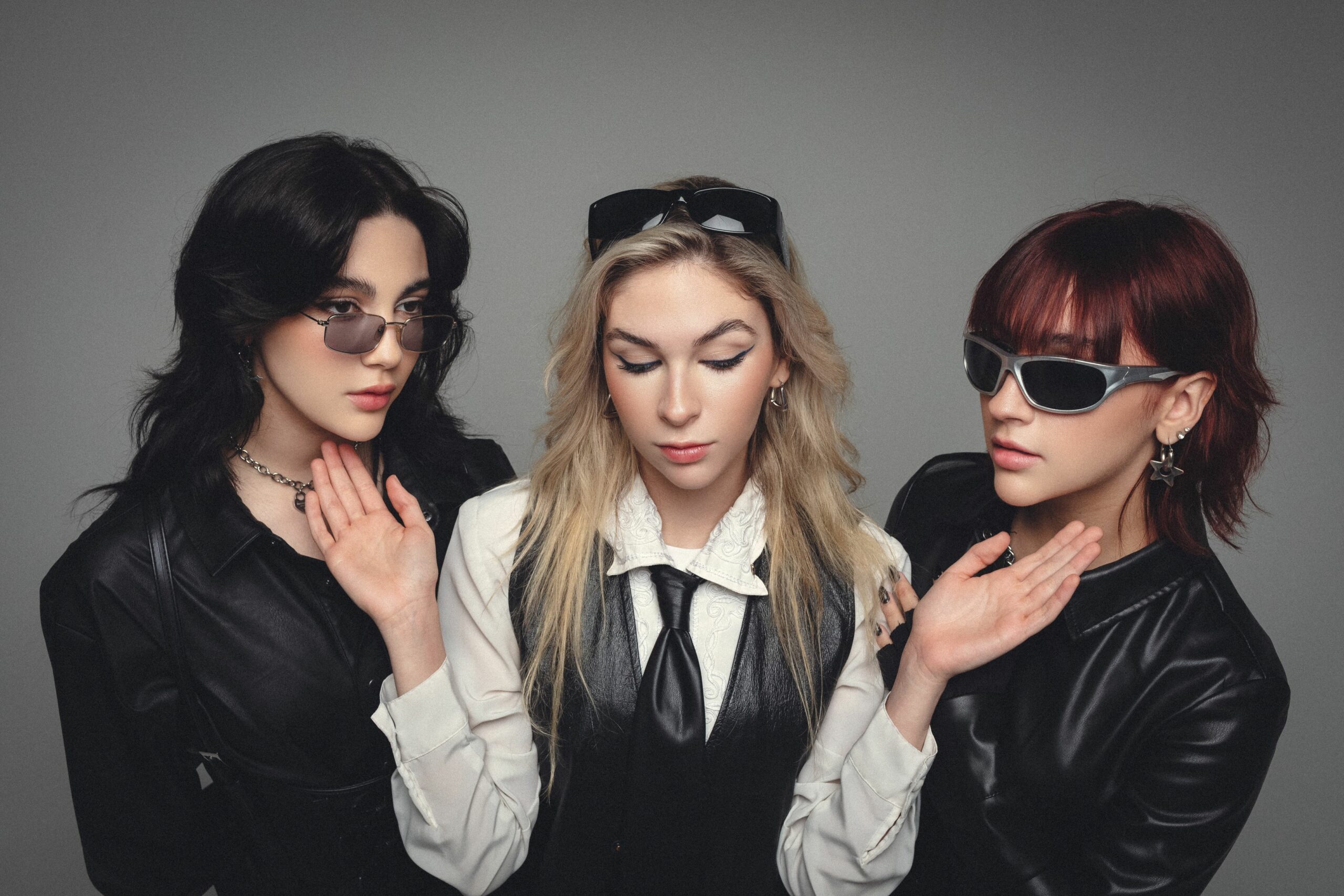The Warning Band Controversy LGBT: A Deep Dive Into The Storm
When it comes to the warning band controversy LGBT, we're talking about one of the most talked-about topics in recent years. It’s not just about a band; it’s about representation, freedom of expression, and the ongoing fight for equality. The Warning, a band that started as a dream, became a symbol for many in the LGBTQ+ community. But like any story, theirs isn’t without its twists and turns. So, buckle up because we’re about to dive deep into this heated debate and uncover the truth behind the controversy.
You might be wondering, why all the fuss? Well, The Warning isn’t just another band playing gigs in dive bars. These sisters from Monterrey, Mexico, have taken the world by storm with their unique sound and unapologetic authenticity. Their rise to fame has been nothing short of inspiring, but with fame comes scrutiny—and boy, have they faced some tough questions. Let’s explore what makes their story so controversial and why it matters to the LGBTQ+ community and beyond.
Now, if you’re here, chances are you’ve heard of The Warning or at least seen some of the drama unfold online. But what’s the real story? Is it about music, identity, or something deeper? We’re here to break it down for you, piece by piece, so you can form your own opinion. So, let’s get into it, shall we?
Understanding the Warning Band Controversy LGBT
Let’s start with the basics. The Warning is a rock band consisting of three sisters: Deneve, Dennise, and Paulina Gaxiola. Their journey began in Monterrey, Mexico, where they honed their craft and developed their signature sound. But it wasn’t just their talent that caught the world’s attention—it was their bold embrace of their identities as queer women. In a genre dominated by male voices, The Warning stood out like a beacon, and that’s where the controversy begins.
Why is this such a big deal? Well, the band’s openness about their sexual orientations and their advocacy for LGBTQ+ rights hasn’t always been met with open arms. Some critics argue that their focus on identity overshadows their music, while others believe they’re using their platform to push an agenda. But here’s the thing: isn’t every artist allowed to express themselves however they see fit? It’s a question that gets to the heart of the debate.
Biography of The Warning Band
Before we dive deeper into the controversy, let’s take a moment to understand who The Warning really are. Below is a quick rundown of their journey so far:
| Band Name | The Warning |
|---|---|
| Members | Deneve, Dennise, and Paulina Gaxiola |
| Origin | Monterrey, Mexico |
| Genre | Rock, Hard Rock |
| Years Active | 2012 - Present |
| Labels | Rocket Juice & Vine, etc. |
As you can see, The Warning isn’t just a flash in the pan. They’ve been making waves in the music industry for over a decade, and their impact is only growing. But with great power comes great responsibility—or in this case, great controversy.
The Roots of the Controversy
So, where exactly did things go sideways? The Warning’s music has always been a blend of hard-hitting riffs and heartfelt lyrics, but it’s their public persona that sparked the most debate. In interviews, the sisters have openly discussed their experiences as LGBTQ+ women and how those experiences shape their art. For some, this is a beautiful example of representation in action. For others, it’s seen as divisive or even controversial.
One of the biggest points of contention is whether The Warning is using their platform to push a specific agenda. Critics argue that their focus on LGBTQ+ issues takes away from their music, while supporters say it’s a necessary part of who they are as artists. It’s a classic case of art vs. activism, and it’s not an easy line to draw.
Breaking Down the Arguments
Let’s break it down a little further:
- Proponents: The Warning is a band that represents the future of music—a future where everyone can be themselves without fear of judgment. Their openness about their identities is a step forward for the LGBTQ+ community and sets a positive example for aspiring musicians.
- Critics: Some argue that The Warning’s focus on identity politics detracts from their musical talent. They believe the band should let their music speak for itself rather than relying on their personal stories to gain attention.
It’s a complex issue, and there’s no easy answer. But one thing is for sure: The Warning has sparked a conversation that needed to happen.
Why Representation Matters
Representation in media and music is more than just a buzzword—it’s a lifeline for many people. For LGBTQ+ individuals, seeing themselves reflected in art can be a powerful experience. It’s not just about visibility; it’s about validation. The Warning understands this, and that’s why they’ve made it a central part of their mission.
But why does it matter so much? Studies have shown that representation can have a profound impact on mental health and self-esteem. When people see themselves in the stories being told, they feel less alone and more empowered. The Warning’s music isn’t just entertainment—it’s a lifeline for many who feel unseen or unheard.
Statistics and Studies
Here are a few statistics that highlight the importance of representation:
- According to a study by GLAAD, 61% of LGBTQ+ youth report feeling isolated because of a lack of representation in media.
- A report by the Trevor Project found that LGBTQ+ youth who have access to affirming spaces and representation are significantly less likely to experience depression or suicidal thoughts.
These numbers don’t lie. Representation isn’t just a nice-to-have—it’s a need-to-have for many in the community.
The Warning Band Controversy LGBT: A Closer Look
Now that we’ve covered the basics, let’s take a closer look at the controversy itself. At its core, the debate is about whether The Warning’s focus on identity is a strength or a weakness. Supporters argue that their openness is a powerful tool for change, while critics believe it distracts from their music.
One of the most common criticisms is that The Warning relies too heavily on their LGBTQ+ identities to gain attention. Some argue that their music wouldn’t be as popular if they didn’t have this added layer of intrigue. But is that really fair? Can’t an artist be both talented and outspoken about their beliefs?
The Role of Social Media
Social media has played a huge role in amplifying the controversy surrounding The Warning. Platforms like Twitter and Instagram have allowed fans and critics alike to voice their opinions, often leading to heated debates. While this increased visibility has helped the band reach new audiences, it’s also exposed them to a flood of criticism.
It’s a double-edged sword, and one that many artists in the LGBTQ+ community face. How do you balance authenticity with commercial success? It’s a question that The Warning continues to grapple with.
What the Critics Are Saying
Let’s address the elephant in the room: what are the critics really saying? While some of the criticism is valid, a lot of it boils down to personal bias. For every person who loves The Warning, there’s someone who thinks they’re overhyped or overly political. But here’s the thing: art is subjective. What resonates with one person might not resonate with another, and that’s okay.
One common critique is that The Warning’s music doesn’t stand on its own. Critics argue that their songs lack the depth or complexity needed to compete with other rock bands. But is that really true? Or is it just a case of bias against LGBTQ+ artists? The truth is, The Warning’s music has been praised by many critics and fans alike. Their unique sound and undeniable talent can’t be ignored.
Addressing the Critics
So, how do you address criticism without losing your authenticity? The Warning has handled it with grace and humor, often using their platform to engage with both fans and critics. They’ve shown that it’s possible to be vulnerable and resilient at the same time.
Here are a few ways The Warning has addressed criticism:
- Engaging with fans on social media to clarify their intentions.
- Using interviews to share their stories and connect with their audience.
- Continuing to create music that speaks to their truth, regardless of outside opinions.
It’s a lesson in staying true to yourself, even in the face of adversity.
Why This Matters to You
At the end of the day, the warning band controversy LGBT isn’t just about one band—it’s about the larger conversation surrounding representation and identity in music. Whether you’re a fan of The Warning or not, it’s important to recognize the impact they’ve had on the industry and the community.
For LGBTQ+ individuals, seeing a band like The Warning succeed is a reminder that there’s a place for everyone in the world of music. It’s a beacon of hope and a call to action for other artists to be unapologetically themselves. For allies, it’s a chance to support a movement that’s changing the face of the music industry for the better.
How You Can Get Involved
If you’re passionate about representation in music, there are plenty of ways to get involved. Here are a few ideas:
- Support LGBTQ+ artists by attending their shows or buying their music.
- Engage in conversations about representation and its importance in media.
- Use your platform to amplify the voices of those who might not have the same opportunities.
Every little bit helps, and together we can create a more inclusive and equitable music industry.
Conclusion: The Warning Band Controversy LGBT
As we wrap up this deep dive into the warning band controversy LGBT, it’s clear that there’s no easy answer. The Warning has sparked a conversation that needed to happen, and whether you agree with them or not, their impact can’t be denied. They’ve shown that art and activism can coexist, and that’s a powerful message for anyone who feels unseen or unheard.
So, what’s next for The Warning? Only time will tell, but one thing is for sure: they’ll continue to push boundaries and challenge the status quo. And that’s exactly why we need them in the music industry today.
Now it’s your turn. What do you think about the warning band controversy LGBT? Let us know in the comments below, and don’t forget to share this article with your friends. Together, we can keep the conversation going and make a difference in the world of music.
Table of Contents
- Understanding the Warning Band Controversy LGBT
- The Roots of the Controversy
- Why Representation Matters
- The Warning Band Controversy LGBT: A Closer Look
- What the Critics Are Saying
- Why This Matters to You
- Biography of The Warning Band
- Breaking Down the Arguments
- Statistics and Studies
- The Role of Social Media
- Addressing the Critics
- How You Can Get Involved



Detail Author:
- Name : Valerie Murazik
- Email : ugrant@hotmail.com
- Birthdate : 1998-03-16
- Address : 85513 Maegan Ports North Rosario, AR 40135
- Phone : (680) 768-6777
- Company : Fay, Bauch and Feest
- Job : Compliance Officers
- Bio : Eligendi natus fugiat velit tempore amet magni perspiciatis corrupti. Aperiam dolores et id rerum mollitia saepe. Sequi et vero dolorem sunt rerum aut hic. Perspiciatis ullam laboriosam harum totam.